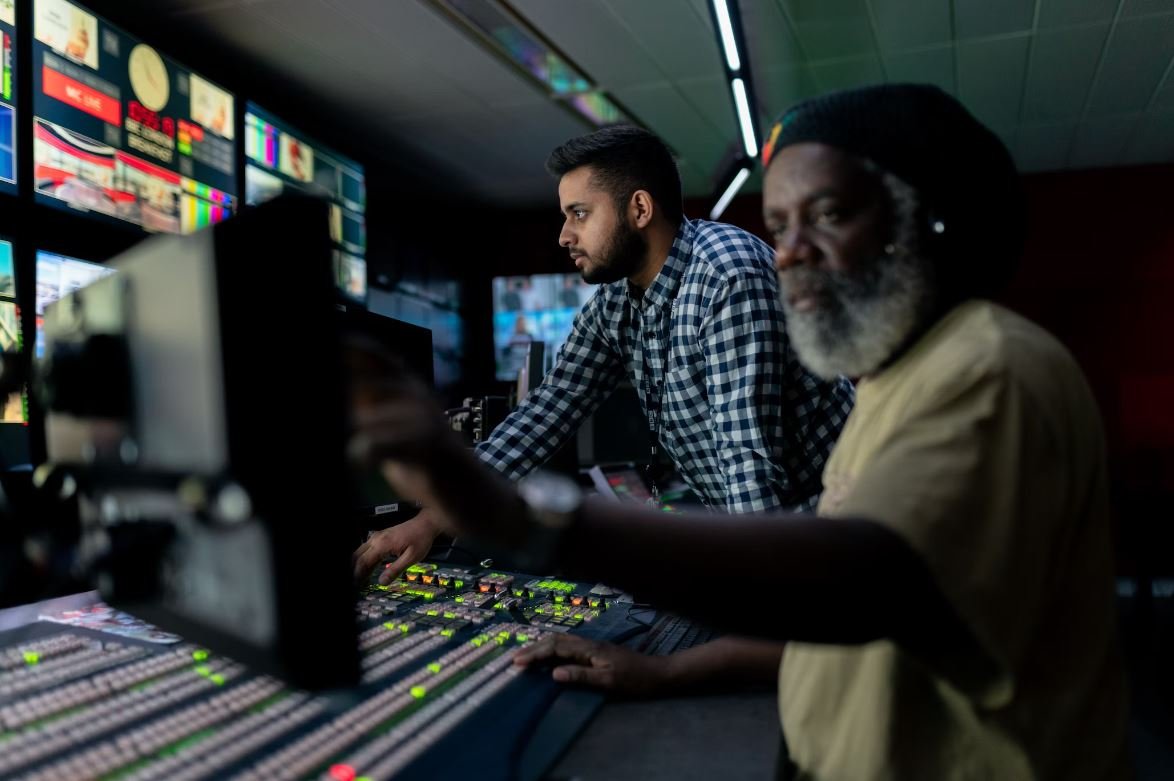Music Journalism
Music journalism is an essential component of the music industry, providing fans with news, interviews, reviews, and other features about their favorite artists and bands. This form of journalism plays a crucial role in shaping public opinion and promoting the work of musicians.
Key Takeaways:
- Music journalism provides fans with news, interviews, reviews, and features about musicians.
- This form of journalism helps shape public opinion about artists.
- Music journalists play a crucial role in promoting musicians and their work.
Music journalists are responsible for staying up-to-date on the latest happenings in the music industry, attending concerts and events, and conducting interviews with artists and industry professionals. They provide insights and analysis on various genres, albums, and songs, and share their opinions with a wide audience through newspapers, magazines, websites, and social media platforms.
Being knowledgeable about various music genres and having excellent writing and interviewing skills are essential requirements for aspiring music journalists.
One of the main tasks of music journalists is to write reviews of albums, live performances, and music events. These reviews help fans decide whether to invest time and money in an artist’s work and provide constructive feedback to musicians. Reviews often include analysis of the music style, lyrics, production quality, and overall impact of the album or performance.
Music reviews often spark discussions and debates among fans, showcasing the strong connection between music journalism and audience engagement.
The Role of Interviews in Music Journalism
Music journalists conduct interviews with artists to provide fans with insights into their creative processes, inspirations, and personal stories. These interviews can take the form of written articles, audio recordings, or video content. By showcasing the personalities and experiences of musicians, interviews enhance fans’ understanding and appreciation of their favorite artists.
Interviews allow fans to feel a closer connection to musicians and understand the stories behind their music.
Evolution of Music Journalism in the Digital Era
| Traditional Media | Online Platforms |
|---|---|
| Newspapers and magazines were the primary sources of music journalism. | Music blogs, websites, and social media platforms have become dominant in the digital age. |
| Printed publications offered in-depth articles and exclusive content. | Online platforms provide real-time news, immediate access to music, and the ability for fans to engage and share opinions instantly. |
The shift towards digital platforms has made music journalism more accessible and interactive.
The Influence of Music Journalism on Public Opinion
Music journalists hold significant influence in shaping public opinion about artists and their work. A positive review or an interview highlighting an artist’s talent and personality can significantly impact their career and popularity. Conversely, negative criticism may lead to a decline in fan base and commercial success.
Music journalists have the power to make or break an artist’s reputation.
The Future of Music Journalism
As the music industry continues to evolve, so does music journalism. With the rise of social media and streaming platforms, the role of music journalists has expanded to include creating content specifically tailored for these platforms. This includes producing engaging videos, podcast episodes, and interactive articles to captivate audiences.
The future of music journalism lies in adapting to new technologies and finding innovative ways to connect with fans.
Conclusion:
Music journalism plays a vital role in the music industry, providing fans with information, analysis, and opinions about their favorite artists. By shaping public opinion, promoting musicians, and facilitating audience engagement, music journalists contribute to the overall success and development of the music industry.

Common Misconceptions
1. Music journalism is all about writing reviews
One common misconception about music journalism is that it solely revolves around writing reviews of albums or performances. While reviewing music is an important aspect of the job, there is much more to music journalism than just critiquing songs. It also involves interviewing artists, researching music history, analyzing trends, and covering important industry news.
- Music journalism includes a wide range of tasks beyond just writing reviews.
- Journalists need to research and stay up to date with music trends and industry news.
- Interviewing musicians is a significant part of music journalism.
2. Music journalists are only interested in mainstream music
Another misconception about music journalism is that it only focuses on mainstream music and popular artists. While mainstream music may receive more coverage due to its wider reach, music journalists also explore and cover genres, subcultures, and independent artists. They aim to provide diverse perspectives and introduce readers to new and exciting music.
- Music journalists cover a wide range of genres, not just mainstream music.
- They aim to introduce readers to up-and-coming artists and underground scenes.
- Diversity and inclusivity are important factors in music journalism.
3. Music journalists are biased and only write positive reviews
There is a misconception that music journalists are biased and only write positive reviews to please artists or labels. In reality, music journalists strive to provide honest and objective opinions about the music they review. While there may be instances where certain biases exist, professional music journalists aim to maintain their integrity and offer fair evaluations.
- Music journalists aim to provide honest and objective reviews.
- They strive to maintain their integrity and avoid biased opinions.
- Negative reviews can be just as valuable in providing constructive criticism.
4. Music journalists have limited knowledge and understanding of the music industry
Some people believe that music journalists have limited knowledge and understanding of the music industry. However, most music journalists are highly knowledgeable and have a deep understanding of the industry. They invest time in studying music history, industry trends, and artist biographies to produce insightful articles and interviews.
- Music journalists dedicate time to study music history and industry trends.
- They aim to provide insightful articles backed by in-depth knowledge.
- Their understanding extends beyond just the surface-level aspects of the industry.
5. Music journalism is a dying profession in the digital age
With the rise of digital music consumption, some may argue that music journalism is a dying profession. However, while the landscape of music journalism has changed significantly with the advent of online platforms and social media, it remains an essential part of the music industry. Music journalists provide critical analysis, interviews, and educational content that fans and musicians alike value.
- Music journalism has adapted to digital platforms and remains relevant.
- Journalists continue to provide critical analysis and educational content.
- Music journalists play a vital role in connecting artists and fans.

Music Journalism
Music journalism is the art of writing and reporting about music, musicians, and the industry itself. It encompasses a wide variety of styles, genres, and trends, providing insight and analysis to music enthusiasts worldwide. From interviews with artists to album reviews and industry news, music journalists play a crucial role in shaping the narrative and discourse surrounding music. The following tables showcase some of the fascinating elements of music journalism.
Artists with the Most Grammy Wins
| Artist | Number of Grammy Wins |
|---|---|
| Beyoncé | 28 |
| Quincy Jones | 27 |
| Georg Solti | 31 |
| Alison Krauss | 27 |
| Stevie Wonder | 25 |
Top-Selling Albums of All Time
| Album | Artist | Number of Copies Sold (in millions) |
|---|---|---|
| “Thriller” | Michael Jackson | 66 |
| “Back in Black” | AC/DC | 50 |
| “The Dark Side of the Moon” | Pink Floyd | 45 |
| “Bat Out of Hell” | Meat Loaf | 43 |
| “Hotel California” | Eagles | 42 |
Popularity of Music Streaming Services
| Streaming Service | Number of Subscribers (in millions) |
|---|---|
| Spotify | 207 |
| Apple Music | 60 |
| Amazon Music | 55 |
| YouTube Music | 35 |
| Deezer | 16 |
Genres Dominating the Charts
| Genre | Percentage of Charted Songs |
|---|---|
| Pop | 45% |
| Hip Hop | 20% |
| Rock | 18% |
| Electronic | 10% |
| R&B | 7% |
Artists with the Most Billboard Hot 100 Hits
| Artist | Number of Hits |
|---|---|
| Drake | 225 |
| Madonna | 168 |
| The Beatles | 71 |
| Rihanna | 66 |
| Elton John | 57 |
Most Expensive Concert Tickets Sold
| Artist | Concert | Ticket Price (in USD) |
|---|---|---|
| The Rolling Stones | A Bigger Bang Tour | $624 |
| Madonna | Sticky & Sweet Tour | $350 |
| U2 | 360° Tour | $325 |
| Paul McCartney | Out There! Tour | $301 |
| Barbra Streisand | The Music…The Mem’ries…The Magic! Tour | $285 |
Albums Spending the Most Weeks at Number One
| Album | Artist | Number of Weeks at Number One |
|---|---|---|
| “Greatest Hits” | Queen | 924 |
| “The Dark Side of the Moon” | Pink Floyd | 937 |
| “Thriller” | Michael Jackson | 788 |
| “Abbey Road” | The Beatles | 737 |
| “Rumours” | Fleetwood Mac | 736 |
Artists with the Longest Concerts
| Artist | Length of Longest Concert (in hours) |
|---|---|
| Bruce Springsteen and The E Street Band | 4 hours, 6 minutes |
| Guns N’ Roses | 3 hours, 41 minutes |
| Prince | 3 hours, 37 minutes |
| Foo Fighters | 3 hours, 29 minutes |
| Tom Petty and The Heartbreakers | 3 hours, 26 minutes |
Artists with the Most Top 10 Hits
| Artist | Number of Top 10 Hits |
|---|---|
| Madonna | 38 |
| The Beatles | 34 |
| Rihanna | 31 |
| Michael Jackson | 30 |
| Mariah Carey | 28 |
Music journalism continues to thrive as a vital component of the music industry. These tables shed light on various aspects, such as the accolades received by artists, the influence of streaming services, the dominance of specific genres, and the commercial success of albums. With each new development and achievement, music journalists tirelessly document and contribute to the ever-evolving musical landscape, ensuring that music is not only felt but also understood and appreciated.
Music Journalism – Frequently Asked Questions
What is music journalism?
Music journalism is the process of reporting, documenting, and critiquing music-related news, events, performances, and trends. It involves writing articles, reviews, interviews, and features that provide insights into the music industry, musicians, and their works.
What qualifications do you need to become a music journalist?
While there is no set educational requirement, a bachelor’s degree in journalism, communication, or a related field can be beneficial. Strong writing skills, a passion for music, and an ability to stay up-to-date with music trends are crucial. Hands-on experience through internships or freelance opportunities is also highly valuable.
What are the primary responsibilities of a music journalist?
A music journalist‘s responsibilities include researching and gathering information about musicians and music-related topics, conducting interviews, attending music events and concerts, writing engaging articles and reviews, and staying informed about new releases and industry developments.
How does music journalism differ from music criticism?
Music journalism encompasses a broader range of writing about music, including news reporting, features, interviews, and analysis. Music criticism specifically focuses on assessing and evaluating the artistic quality and impact of music, often through reviews or opinion pieces.
What are the different types of music journalism?
There are various forms of music journalism, including album reviews, artist profiles, concert/recital reviews, trend analysis, music news reporting, feature stories, and in-depth interviews with musicians. Additionally, music journalists may specialize in specific genres or aspects of the industry.
How has digital media influenced music journalism?
Digital media has greatly impacted music journalism by providing new platforms for sharing content, reaching wider audiences, and engaging with readers. It has democratized the field, allowing anyone with internet access to become a music journalist through blogs, podcasts, social media, and online publications.
What skills are essential for a successful music journalist?
Essential skills for music journalists include excellent writing and communication abilities, strong research skills, critical thinking, knowledge of music history and theory, attention to detail, the ability to meet deadlines, multimedia literacy, and an understanding of ethical journalistic practices.
How can I get my music reviewed by a music journalist?
Getting your music reviewed by a music journalist can be achieved through various methods. One option is to directly reach out to journalists or media outlets by sending press releases, promotional material, or digital copies of your music. Engaging in active promotion on social media and networking within the music industry can also increase your chances of getting reviewed.
Where can I find music journalism job opportunities?
Music journalism job opportunities can be found in traditional media outlets such as newspapers, magazines, and radio stations. However, with the rise of digital media, many music journalists now work for online publications, music blogs, streaming platforms, and independent media organizations. Online job boards, networking events, and industry-specific websites are useful resources for finding music journalism job openings.
How do I stay updated with the latest music journalism trends and developments?
Staying updated with the latest music journalism trends and developments can be accomplished by regularly reading music publications, following reputable music journalists and industry insiders on social media, attending industry events and conferences, joining professional organizations, and participating in workshops or webinars that focus on music journalism.




